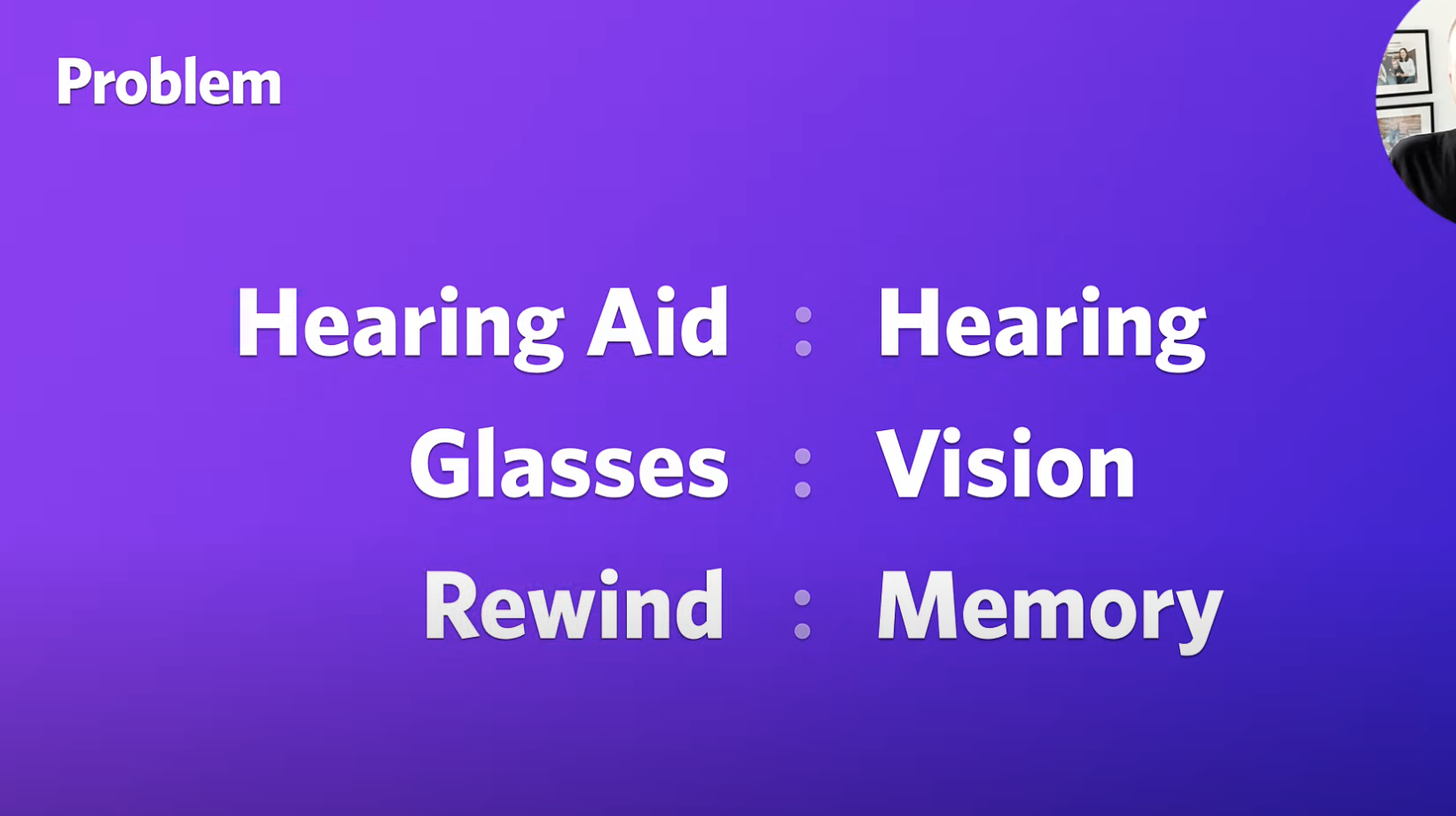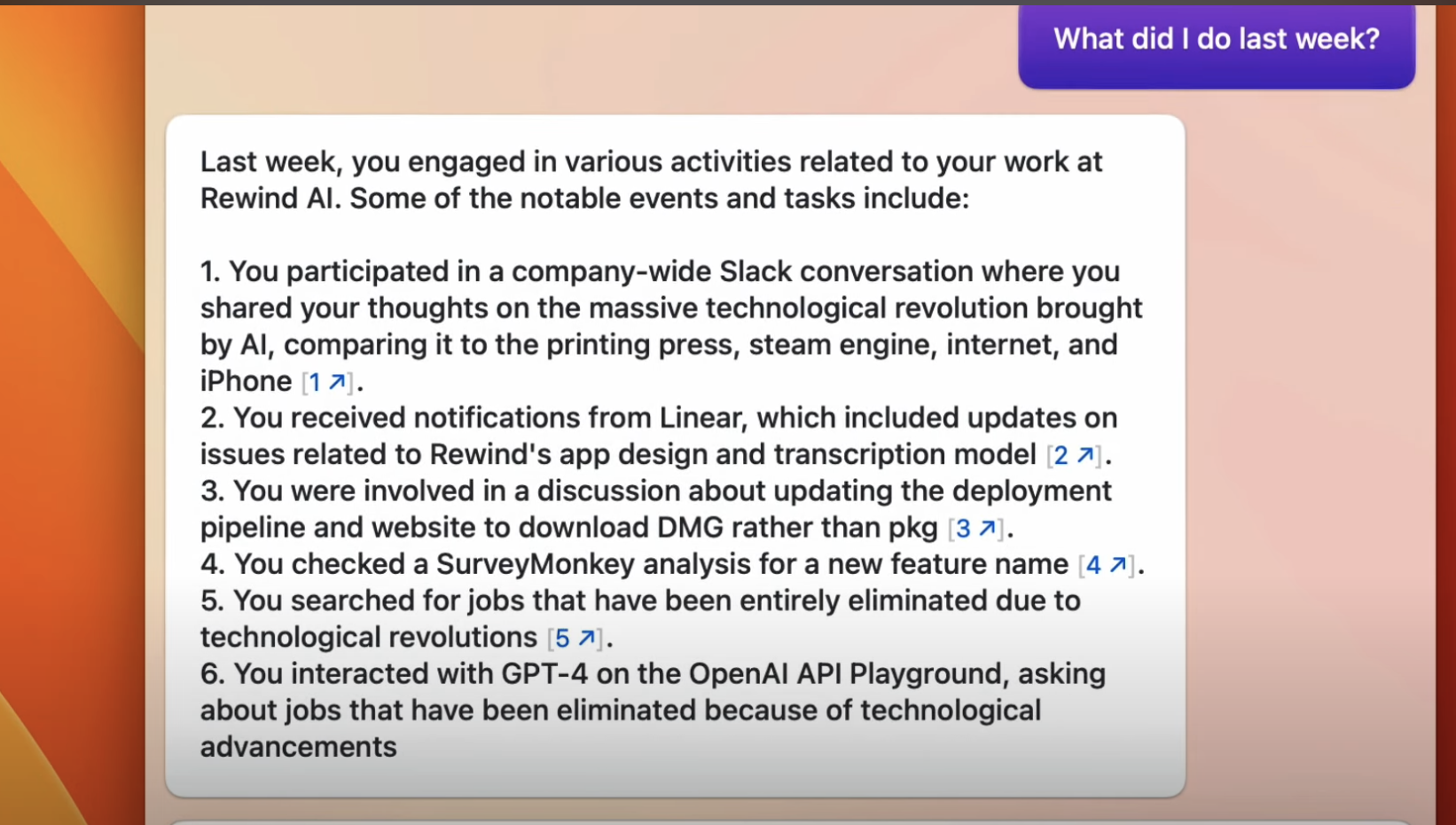Be Kind, Don't Rewind
I came across Rewind, a company with an interesting premise.
What if you had perfect memory?
Translation: "what if all of the activities on my computer were recorded, compressed, and searchable (including meetings as well)". Why? The marketing team deftly places it as a productivity enhancement tool. My guess is that It'd be hard to sell a demo with someone using the app mournfully in a "non-productive" way, "timeline scrubbing" past video calls, texts, etc. they made with their ex.

To start, there are some valid privacy concerns here, some of which are addressed in their privacy policy. Questions like where the data lives, how it interacts with third parties, if telemetry can be retrieved/downloaded in full, and whether or not we can have a 'right to be forgotten'. "Inverse Surveillance" comes to my mind as well. In short, this concept suggests that by self-logging everything, you become a willing datapoint for mass surveillance; helpfully aggregating, sorting, and presenting easily subpoenaed material (if you're lucky). These are worth revisiting as the technology becomes widely adopted.
I want to interrogate the entire premise however, not just its post-hoc externalities. What if forgetting is a part of abstraction, forgiveness and much else we don't yet understand? What if it is fundamental to being human, perhaps Hyperthymesia might not be what we want. Just like how our bodies enact waste clearance during sleep, maybe forgetting has a similar effect, but for our sanity and well being more than anything.
I obviously can't answer this question in any positivist fashion, but I can draw some parallels to things I've read. Ted Chiang's The Truth of Fact, the Truth of Feeling is one of them. The story has a program very similar to Rewind called "Remem", which grants users a fine level of control over their memories. It adds powers to people's existing "life logs", which are "the most complete photo album imaginable, but like most photo albums, they live dormant except on special occasions" (Chiang 187). Remem makes existing data accessible, not unlike large language models today, not unlike Rewind itself, as they've started leveraging GPT-4. I want to look at plausible "thought processing" issues with consistently using the tech, and later, focus a bit on social impact.
Rewind's CEO's own story mentions,
what if we could use technology to augment our memory the same way a hearing aid can augment our hearing?

This is one of the animating forces behind the company. While a hearing aid is meant to restore baseline functionality, Rewind is meant to enhance our memory, "superhuman" as the company puts it. I think this places the app somewhere in the region of Buckminster Fuller's Dymaxion Chronofile, Personal Knowledge Management (PKM) systems, and various "life logging" experiments. Most of these technologies are devised and maintained by certain kinds of personalities, people who are predisposed to productivity and hyper optimization, to say the least. Rewind calls them "Context Switchers".

Solomon Shereshevsky is an interesting case study when looking at superhuman memory. His incredible recall had a profoundly negative effect on his ability to abstract. Briefly mentioned by Chiang, his story and his becoming of a "Soviet Funes" was explored in a New Yorker article:
These cognitive deficiencies, Luria suggests, were related to S.’s extraordinary episodic memory—the memory we have for personal experiences, as opposed to semantic memory (which tells us, for instance, that the dromedary has only one hump). Deriving meaning from the world requires us to relinquish some of its texture. S.’s case, as many readers have noted, resembles the Jorge Luis Borges story “Funes the Memorious,” a fictional work about a man plagued by the persistence of his memory. “To think is to forget a difference, to generalize, to abstract,”
To overcome phenomena such the somewhat studied Ebbinghaus Forgetting Curve(See Figure 1, it's referenced in Rewind's marketing), could we be impacting our ability to make sense of the world? Individuals like Shereshevsky, among many others, purport a decline in their qualitative experience of thinking, in relation to what's considered typical. In Chiang's story, the society sits closer to some sort of memory event horizon, people have widely adopted devices such as Remem, and the fallible process of accessing memories (one of degradation, change, "seeing through gauze"), is replaced by cold desaturated video. Just the facts with none of the texture.
From, "Forgetfulness is a key to a healthy mind", the author boils it down to:
it isn't just about retaining the significant stuff. Far more important is being able to forget the rest
This point, about the importance of forgetting, is measurable, although I'm not sure how ethically. The closest and still ongoing "experiment" today might be Google ("Googling things"), which has offloaded some amount of cognition from us, downplaying the obsessive need hold on to knowledge. Scaled even further are the new large language models, which augment the facts with authoritative, sometimes hallucinatory rhetoric.
The use of GPT-4 in aggregating significant events from your recordings is where Rewind strays from Chiang's Remem. It can "decide" what's important and what isn't. Having your memory be indexable is one thing (with its own set of concerns), but piping that through to an arguably very public beta LLM, seems fraught. This can arbitrarily reinforce what it deems significant, "training" your recollection without much context. What you did last week is now filtered and codified to whatever the model calculates, even if it doesn't hallucinate, it would still tinge your own recollection.You wouldn't be making any value judgements on what the week consisted of.

What I've been mentioning, in my mind, all sits atop a more immediate human concern, not that we'll lose our ability to abstract/think/regulate our cognition, but that it'll just cause more social issues.
In Chiang's story, a Remem spokesperson, in response to criticism about couples abusing the system (pulling up old arguments/recordings etc.), says that Remem itself doesn't give people a "Scorekeeping mentality" (Chiang 193). Interestingly, Rewinds CEO gives an even more optimistic claim about the very same idea, in response to someone on Twitter likening the app to a Black Mirror episode.
Fantastic episode! “The Entire History of You” The biggest difference is that I believe we would all be more honest with one another if we had perfect memory. It would prevent more marital strife than it would create.
I find myself recalling this in response, from Chiang (198)
If someone's marriage was built on -- as ironic as it might sounds -- a cornerstone of forgetfulness, what right did Whetstone (company that makes Remem) have to shatter that?
Relationships of any kind are constantly evolving, whether the system can "prevent" marital strife is very contextual. Rewinds CEO is echoing a change of heart on the part of Chiang's narrator as well, near the end of the story, he slowly starts seeing the tool as a way to be better, to litigate his own behaviour without any filters. However, I think this warming up is in part due to the unreliable nature of our unnamed narrator.
As the narrator decides to use Remem, he stumbles upon a pivotal moment in which he had a fight with his daughter. Many years ago, that fight had seemed fairly one sided, in a fit of rightful frustration, he remembers her saying she doesn't love him anymore, that he was the reason her mother had left them. The hazy memory is eventually rectified with Remem's recording of the event, revealed through a data request. It was actually he who had said those words, not his daughter. He fell victim to confabulation, either intentionally or as self preservation.
Its here where, to me, the narrator forms a just-so, "Whig" history of his own self determination, to his becoming of a better person. The hard documented truth of his life, which he decides to open source for the entire world, can't be the truth of feeling because Remem has no access to that, it's only a reflection of the shallowest reality. It's worth mentioning that this sentiment is reflected in a story within the story about the introduction of reading and writing to the Tiv tribe in the early 20th century. In this tale, the tribe shuns writing, as the young protagonist "had come to trust what was written on paper over what was said by people, and that wasn’t the Tiv way." The tribe's sentiments are based on the present truth, "There is what’s right, mimi, and what’s precise, vough". Remem/Rewind is vough.
People may use Rewind to prevent marital strife, but if that impulse exists, it exists independent of the tool. Rewinds vough wouldn't be convincing if someone is genuinely trying to resolve a dispute, in fact, I think it'd be superfluous in all but the most cut and dry cases. More data, more resolution, even with an LLM behind it, won't get to mimi, because that still involves a person in the present, to interact and leverage their past, but not use it as demonstrable data points for the project of being "better". Chiang's narrator is unreliable because he thinks that the trappings of open sourcing his Remem and the gymnastics of assisted "betterment" are proof positive of his salvation.
I think tools like these in social situations are all but meant for scorekeeping, and can hardly resolve anything on a personal level. There are use-cases for law enforcement or incriminating yourself and others, but that's certainly not the vision that Rewind has. As a productivity tool, I think a notepad can suffice, with the added benefit of your writing going through multiple passes of the most advanced intelligence we have unfettered access to without any token limits...our own. To extend some charity, assuming the "goal" of Rewind isn't just marketing, maybe this is guided by nostalgia. In the future you can go back and relive certain events, you can see your children as they were, revisit your childhood and so on, live that past again. Memory can guide our future actions, but I think it's best situated in the realm of fleeting, "laughing ghosts" as Rod Serling put it:
perhaps there'll be an occasion - maybe a summer night sometime - when he'll look up from what he's doing and listen to the distant music of a calliope, and hear the voices and the laughter of the people and the places of his past. And perhaps across his mind, there'll flit a little errant wish, that a man might not have to become old, never outgrow the parks and the merry-go-rounds of his youth. And he'll smile then, too, because he'll know that it is just an errant wish, some wisp of memory, not too important really, some laughing ghosts that would cross a man's mind...
Chiang, Ted. Exhalation. Alfred A. Knopf, 2019.